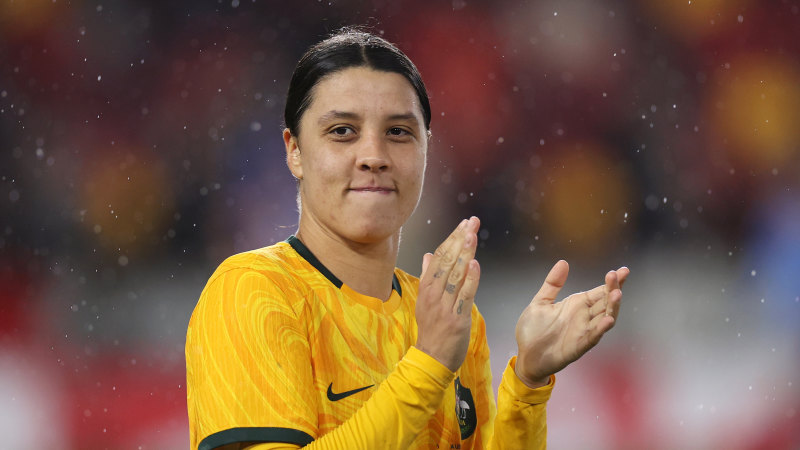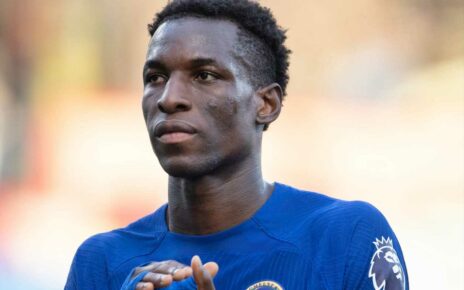Save articles for later
Add articles to your saved list and come back to them any time.
Had the FIFA Women’s World Cup been in the bailiwick of Victorian Premier Daniel Andrews, might he have cancelled it? Would the economics of the event, launching in Sydney and Auckland tonight, have stacked up? For any major sporting event to be deemed successful – beyond the big splash of staging it – there must be lasting economic and social benefits shared across the community.
Matildas skipper Sam Kerr in action against England during a friendly match in April.Credit: Reuters
Andrews’ sudden cancellation of the Commonwealth Games on Tuesday came as a shock to many. He claimed costs had blown out to as much as $7 billion rather than the $2-3 billion originally anticipated. As the Gold Coast Commonwealth Games cost about $1.5 billion and Birmingham’s $1.7 billion, how did Andrews arrive at $7 billion? Was it because he insisted it would be in the regions, not Melbourne, so they needed new infrastructure? Or was it because they were spreading the cost of security across several towns? It seems a bit of a mystery.
But should we really be shocked? From the Olympic Games to the financing of a local footy stadium in Tasmania (a bargain at $715 million, by the way), the economics of sport has become controversial.
In fact, Matt Carroll, CEO of the Australian Olympic Committee, explains the new candidature model of hosting under the International Olympic Committee’s “new norm”. It aims to prevent the bidding countries – especially ones with limited resources – attempting to outbid each other. “As much as possible, you want the Olympics to be able to be hosted on existing infrastructure,” Carroll said. “That is the benefit of a place like Brisbane that has excellent sporting facilities, especially when you factor in the Gold Coast and Sunshine Coast as well.”
That is why, when Paris and Los Angeles both bid for next year’s Olympics, the IOC negotiated for Paris to hold the 2024 Games and LA the 2028 Games. Brisbane will follow in 2032. The “new norm” spares countries the waste of bidding and missing out, of building infrastructure that may become obsolete, and of draining economies already struggling to tackle poverty and environmental crises.
But Carroll also points out that the Olympics, and the Commonwealth Games, are important for second-tier sports that don’t have the resources of the NRL, AFL, cricket and tennis and, increasingly, soccer. “The Games matter for these sports, like hockey for example, that don’t have the commercial capacity of other larger codes. These sports are important grassroots sports with great followings in the suburbs and regional Australia.”
This is why the University of Technology Sydney, at its Centre for Sport, Business and Society, is investigating how greater participation in sport helps to improve productivity and drive down health costs and related social expenditure. While we all love a Cathy Freeman, Sam Kerr or Steve Smith, we can’t have all our sports resources invested in the top 1 per cent of our talent. There is no trickle-down in sports economics. An Olympic stadium is not the field of your daughters’ and sons’ Saturday soccer dreams.
Should we worry, then, about the economics of the FIFA Women’s World Cup? It is, after all, the biggest event Australia has hosted since the pandemic and one of the biggest since the Sydney 2000 Olympics.
But it has much going for it. First, Football Australia estimates $400 million plus in total benefits, 60,000 people visiting Australia and thousands of jobs. Second, no new infrastructure was required, so costs have been kept down, faithful to the “new candidature model”, as mentioned by Matt Carroll. Third, sharing the hosting rights with New Zealand means sharing the revenue but also the overhead costs.
However, when the carnival is over, what will be the legacy beyond the boost in trade and tourism? Football Australia points to Legacy23, its plan to deliver immediate and long-term community and economic benefits. According to Sarah Walsh, FA’s head of women’s football, Women’s World Cup legacy and inclusion, there will be a surge in female participation in the game.
“We are looking at 407,000 new participants coming into the game who are women and girls,” Walsh says, “so the real problem – and an opportunity we have – is that they’re going to need more places to play. We have over 2500 pitches and community clubs in Australia, but only one in five community clubs are actually female-friendly. It’s a real concern and it’s a real opportunity that the legacy plan hopes to really correct and capitalise on.”
Legacy is one thing; there is also leverage. When I was Austrade chief economist, we developed Business Club Australia, a business-diplomatic networking body that generated $1.7 billion in trade and investment deals between the Sydney 2000 and Beijing 2008 Olympics alone, demonstrating the power of “schmooze”. It worked at the Commonwealth Games in Melbourne in 2006 with key trading partners such as India, South Africa, Singapore, Malaysia, Canada and the UK member countries.
It could be that we haven’t leveraged the Commonwealth Games enough. Pacific nations, for example, matter. Sports – especially the rugby codes and soccer – can help, but so can the Comm Games. Foreign Minister Penny Wong’s re-engagement with the Pacific has been excellent so far. I hope the 2026 Games’ cancellation has little adverse impact on our friends in the Pacific.
When the Commonwealth Games were held in Brisbane in 1982, a giant Kangaroo float nicknamed Matilda charmed us, especially when she winked at the end. In 2023, in the coming weeks, it will be a whole team of Matildas hoping to win our hearts and minds.
Almost six years ago, I wrote a report about the crowd for the Matildas being 15,089 in Penrith when they won in a “friendly” against the well-fancied Brazil. With a strike by Lisa de Vanna and a glancing header by Sam Kerr, Australia beat Brazil 2-1. On Thursday night, the Matildas play before 80,000-plus at the Olympic Stadium in Homebush in the opening round of the World Cup.
With numbers like that, I doubt even Dan Andrews would think of cancelling them.
Tim Harcourt is industry professor and chief economist at the Institute for Public Policy and Governance at the University of Technology Sydney. He is a former RBA and ACTU economist and expert panel member of the Fair Work Commission. He hosts Footynomics – The Economics of Sport www.footynomics.com.au
Most Viewed in Sport
From our partners
Source: Read Full Article




